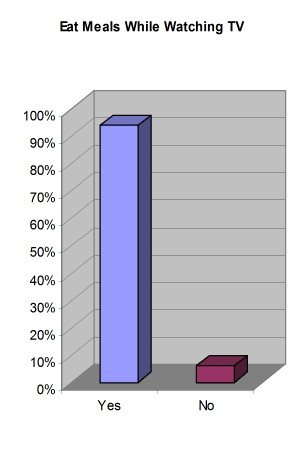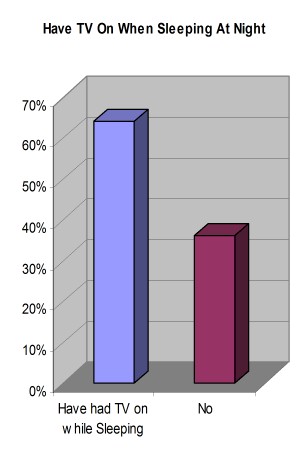Chapter 4: Question 1
1. In our society, what habits have evolved into becoming part of a daily routine that includes television and computers?
Meals are being eaten in front of the television in 94% of the households of those surveyed. Eighty-two percent of these households eat their meals while ingesting the corporate message on a regular basis.

Where mealtimes had once been a time for a family to converse about what had occurred during their day's activities and offer each other advice, guidance and encouragement (Jana, 2000; Mander, 1978) the typical family now receives the advice and encouragement from corporate sponsors who first portray a fictitious character's days activities followed by advice, guidance and encouragement that inevitably meets the corporate goals of molding viewers desires and needs into that which would increase sales profits (Kocher, 2001; Rushkoff, 2001). Joe told me that he "eats just about every meal in front of the TV."…"Mom works at night so I eat supper with my sister, we keep the TV on in the kitchen…I don't want to talk to my sister anyways…she has nothing to say that I wanna hear….I like to eat and watch TV…" When I asked Joe if, when his Mom is home, do they turn off the TV when they eat together and he said, "No, Mom eats in the kitchen, she watches her show…sometimes my sister sits there with her and I go out into the living room and eat out there…I like my shows." Television has become a member of our family (Dickenson, 2000; Mander, 1978; Postman), an important and influential member. Through TV programming and commercials, advice is being given out on a daily basis on how to behave; how to handle relationships; how to dress; what to eat - practically a surrogate parent figure filling voids that are in many people's lives (Mander, 1978, McChesney, 2000). Marie tells me, "I enjoy watching the talk shows, I can learn so much from them…". Advice, once given by the loving parent with an emotional attachment and a vested interest in the welfare of the child (Greto, 1999; Jana, 2000) is now in the hands of network sponsors. Even spouses, returning home after a long day at work find solace and diversion not from their mate but from the ever patient, always available television program. Frank told me that he often watches TV after coming home from work; he does it because he doesn't want to think. He does it, "because I'm tired of thinking." Ann relates the same feeling, "I get home and all I want to do is to 'veg-out', I've had it by then….I've been thinking all day long, I need a break!" Of all the households in the United States, only two percent do not have a television (Neilsen, 2000). None of those surveyed belonged to that small percentage group, 100% stated that not only did they have a TV at home, that their homes had three or more TV sets. Eighty-two percent actually have at least four televisions, practically one in every room in the house. When asked about how many TV sets she had, Ann replied, "Well, I only have three, one in the living room, one in my bedroom and one in my kitchen…I like having one in the kitchen 'cause I can watch a show when I'm cooking, then, when my dinner is set I can bring my plate to the living room and watch the show in there without missing anything!".
Corporate goals include the development of brand loyalty (Rushkoff, 2001) throughout a particular targeted group of society. By the development of specialized themes in programming, a certain segment of society can be drawn into viewing the program on a regular basis (Rushkoff, 2001). Eighty-five percent of those surveyed had a favorite television show that they will regularly view. All seven of those interviewed called certain programs, "my show", a sense of ownership and possession concerning a particular program. Seventy-nine percent admit to planning their daily schedules around the broadcast time of a particular show. Where once a family gauged time around work, school, and social commitments (Postman, 1986), we now have allowed the media broadcasters to mold our personal time to fit into a carefully planned curriculum of life management. Tina told me that, "Sometimes I call a friend to do something and my friend says 'no, because my show is coming on soon, I don't want to miss it." I asked Tina how she felt when her friend said that and she replied, "Well, I guess I don't mind… I have favorite shows to that I don't like to miss…" Marie, when asked about watching favorite shows tells me that she never answers the telephone between 7-o-clock and 8-o-clock every evening because her two favorite shows are on then. I asked her if they were re-runs, "oh yes…but I still don't want to miss them, they are so funny!". "How about taping them to watch later?" I asked. "That isn't the same", she replied.
When questioned about the most often done activity upon returning home after a day at work or school, 85% included TV viewing as the number one pastime. This critical transition time (Hunter, 1958; Kocher, 2001) where an individual is re-adjusting him or herself to the different demands, personal roles and atmosphere of home versus work or school, the TV program has become the tool, the bridge, between people's various life-role realities. As Joe put it, "I just like to sit down and stop thinking…. I'm tired when I get home from school….I don't want to think of anything so I turn on the TV". Ed has similar feelings, he shared these thoughts, " I like to sit down in front of the ol' tube and just zone out… you know, forget about everything…". Offering a prescribed amount of information under the guise of entertainment or news, the transnational corporate sponsors have successfully intertwined their message, their carefully orchestrated mantra onto an unsuspecting public (Rushkoff, 2001). According to Ben H. Bagdikian, cited in Rushkoff's PBS Frontline Report, "In the frenetic race for attention, media companies adopt any means to freeze viewers' eyes in order to prevent viewers from changing channels". Laura had this to add, " I'm tired of thinking…. that's all I do all day at work, when I come home I want to relax, I want to unwind, I don't want to think, I turn on the TV…. I keep it on all night long. When I am making supper I watch TV, it's better than just thinking about cooking…sometimes I just sit there for hours, just staring…its great relaxation!".
Another part of our routine, going to sleep at night, now includes technology. Of those surveyed 80% said that they kept music playing in their bedroom when they went to bed and 72% keep the TV on. Sixty-two percent are not only watching over six hours of TV during the day, but they are also listening to over six hours of either TV audio messaging or radio/music messaging as well. Many people are spending well over half their day listening and viewing the corporate message.

Having determined that many students spend a fair amount of time viewing television as a pastime while at home I felt it important to see if television is being used in the schools themselves. Ninety-two percent of the students who answered the survey said that their teachers have used the TV in the classroom to show some type of regular programming. In my observations I have seen programs that had been taped by the teacher at home and then shown to their class. There were a large variety of programs taped, many science-based programs and many historical docudramas. In about half the instances, the commercials where not edited out of the video, so were shown along with the programming. Tina remembers being in school and watching Channel One, a specialized programming station with claims of providing educational content. Tina explains the system, " The TV sets are paid for by Channel One but the school has to agree to having the TV set on for a certain amount of time every day. Every homeroom period, when I was in high school, we had the TV blaring…you couldn't ignore it no matter how hard you tried…and if you wanted to talk with your friend next to you the teacher would yell, saying that we had to listen to the TV…. there were a lot of commercials that were on it...I don't remember anything educational…maybe some news items were discussed…I just remember not liking it." Frank admits to using a taped TV program to show his history class on days when he has to catch up on his grading papers, " I keep a collection of shows taped, so do other teachers…. The kids love watching them, I think that they get a good perspective from seeing these re-creations…. they loved watching "Titanic", the clothes, the way people talked, it was great educationally! I'll tape things from Discovery Channel, that's always a good place to find a show that fits into the curriculum."
Copyright 2001